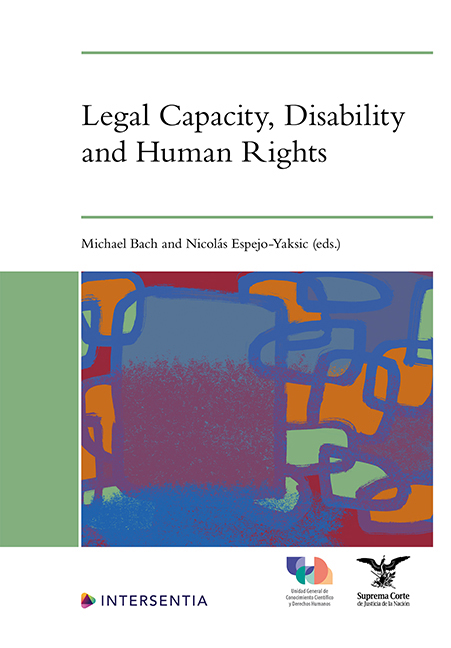Book contents
- Frontmatter
- Foreword
- Acknowledgements
- Contents
- List of Cases
- List of Contributors
- Legal Capacity, Disability and Human Rights: Introduction
- PART I HISTORICAL PERSPECTIVES AND THEORETICAL FRAMES
- PART II LAW REFORM: COUNTRY AND REGIONAL PERSPECTIVES
- PART III LEGAL QUESTIONS, PERSISTENT CHALLENGES
- Index
- About the Editors
Foreword
Published online by Cambridge University Press: 03 April 2024
- Frontmatter
- Foreword
- Acknowledgements
- Contents
- List of Cases
- List of Contributors
- Legal Capacity, Disability and Human Rights: Introduction
- PART I HISTORICAL PERSPECTIVES AND THEORETICAL FRAMES
- PART II LAW REFORM: COUNTRY AND REGIONAL PERSPECTIVES
- PART III LEGAL QUESTIONS, PERSISTENT CHALLENGES
- Index
- About the Editors
Summary
For more than a decade, Mexico has undergone a substantive constitutional transformation. The 2011 constitutional reform on human rights empowers judges to strengthen the protection of all fundamental rights recognised boThby the Political Constitution and the human rights norms recognised in international treaties ratified by Mexico. This transformation has included the effective protection of the constitutional rights of persons with disabilities.
The Supreme Court of Justice of Mexico has undertaken several actions to fully adopt the social model of disability, whose main tenet is the elimination of all barriers that prevent the full exercising of rights under equality of opportunities. On the one hand, this Court has consistently affirmed in its judicial precedents, the equal right of all people to exercise their legal capacity, to be assisted to this end and to be safeguarded against abuses. To fully achieve this goal, the Court has exhorted legislative authorities to adopt concrete measures to align domestic laws with Article 12 of the UN Convention on the Rights of Persons with Disabilities. On the other hand, the Court has adopted specific protocols to facilitate access to justice for people with disabilities and has designed and promoted training programmes and activities to consolidate a deeper legal awareness about this matter.
This book represents a valuable contribution to deepening our understanding of what is required to protect the equal right to legal capacity and to avoid any discrimination based on the intellectual, cognitive, and psychosocial disabilities of a person. By looking at the theoretical, historical, comparative and critical dimensions of new legal regimes for legal capacity in Latin America and the world, the Supreme Court of Mexico expects to contribute towards the global goal of making all human rights effective to all.
- Type
- Chapter
- Information
- Legal Capacity, Disability and Human Rights , pp. v - viPublisher: IntersentiaPrint publication year: 2023



